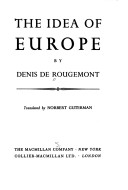The Idea of Europe in the work of Denis de Rougemont and the French non-conformists
09/03/2009 Leave a comment
Denis de Rougemont was a main thinker of the so-called non-conformistes des années trente, a movement of young intellectuals that appeared in France at the beginning of the turbulent 1930s, in opposition to both the individualism of liberalism and the collectivism of the Soviet Russia. [1] The main bulk of their work was published between 1930-34 and was concentrated around three separate currents:
1930s, in opposition to both the individualism of liberalism and the collectivism of the Soviet Russia. [1] The main bulk of their work was published between 1930-34 and was concentrated around three separate currents:
- The founders and members of L’Ordre nouveau. An intellectual movement established by the Russian migrant Alexandre Marc (born in 1904 in Odessa as Aleksander Markovitch Lipiansky), its goal was to prepare the conditions for a ‘spiritual rebirth’ of the European culture. Its effort was concentrated on going beyond such dualistic divisions as nationalism-internationalism and capitalism-communism. Its inspirations came, among other sources, from the Christian existentialism of Kierkegaard, the federalism of Proudhon, the great critique of Modernity Nietzsche, or from the historicism of Péguy. The thinkers who were a part of L’Ordre nouveau also included Robert Aron, Arnaud Dandieu, Daniel-Rops, Jean Jardin and finally Denis de Rougemont.
- The Catholic revue L’Esprit of Emmanuel Mounier, founded in 1932. From the beginning it evolved in tight collaboration with L’Ordre nouveau. In reaction to the events of the Second World War it radically shifted to the political left , in order to slowly move back to more moderate positions of the ‘New Left’, under which it still publishes to this date.
- Young thinkers of Jeune Droite, who were mostly dissidents of the French reactionary and monarchistic right Açtion française. These thinkers included Jean de Fabrègues, Jean-Pierre Maxence and Thierry Maulnier.